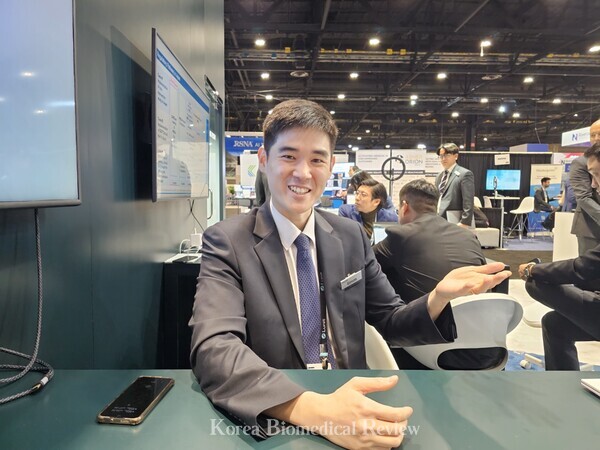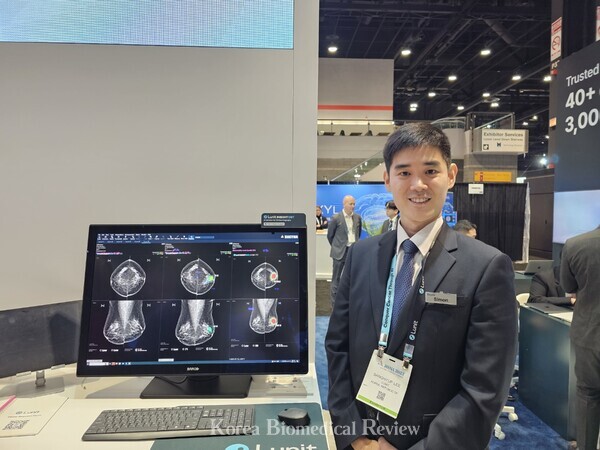CHICAGO, Ill. -- By Lee Han-soo/Korea Biomedical correspondent – At the recent Radiological Society of North America (RSNA) 2023 conference, Lee Sang-hyup, Vice President of the Medical Directives Department at Lunit, engaged in an insightful discussion with Korea Biomedical Review, offering a detailed perspective on the convergence of radiology and artificial intelligence.

Lee, a former radiologist who completed his medical residency at Seoul National University Hospital, has been instrumental in Lunit's pioneering AI initiatives since his joining in early 2020.
Lee's move from clinical practice to the forefront of medical technology innovation was driven by his early involvement in groundbreaking AI research.
"My journey with Lunit began with a fascination for how AI could outperform even skilled radiologists in certain tasks, such as identifying lung cancer nodules in chest X-rays," Lee said.
This realization occurred during his residency, where he actively contributed to clinical trials assessing the effectiveness of AI compared to human expertise.
"I was aware of Lunit earlier than most of my peers, especially since I was part of the initial research on their first product during my time at Seoul National University Hospital," he said. "As I was about to finish my residency, the company reached out to the hospital. They were looking for additional experts in radiology and wondered if there were any potential candidates."
During that period, he was already contemplating his future career path. When the opportunity arose, he didn't hesitate and promptly decided to join them.
Lee's transition from a medical practitioner to a corporate role provides a unique perspective in his approach to work.

"As a resident, my focuses during past RSNAs were on learning and contributing to the medical community," he said. "However, now representing Lunit, my responsibility extends to delivering value through innovative solutions."
This transition signifies a broader trend in healthcare where professionals straddle the line between clinical practice and technological advancement.
Discussing Lunit's services, Lee emphasized their focus on assisting radiologists to improve efficiency and reduce burnout.
"Our AI models are designed to support, not replace, radiologists, and by accelerating the interpretation of normal findings, radiologists can focus more on complex cases," Lee said. "
He also highlighted the challenges of integrating AI into clinical workflows, citing the need for clear, demonstrable value and economic benefits.
Lee acknowledged that there are still a mix of technical, regulatory, and reimbursement hurdles to overcome for seamless integration of AI into clinical practice.
Differences in AI acceptance among radiologists worldwide are also an issue that Lunit is trying to address. He observed that attitudes and expectations vary greatly, necessitating a tailored approach to AI implementation in different regions and institutions.
"For example, some people desire customization in the algorithms themselves, such as when implementing them on the picture archiving and communication system (PACS)," Lee said.
Understanding and addressing the unique needs of each radiologist and institution is essential for the successful adoption of AI in medical imaging, Lee added.
Lee also delved into Lunit's strategy for international expansion, with a specific focus on the role of Lunit Insight in global markets.
"Our extensive, high-quality dataset sets us apart as early on, we recognized the importance of data in developing robust AI models, a challenge that new entrants in the field are now facing."
Lee emphasized that as one of the pioneers in the field, Lunit's advantage lies in its focused selection and concentration on specific domains.
"Such a clear business model is crucial as we understand what users truly need and consider important, and such data can only be gathered in the real world," Lee said. "This isn't something that can be accomplished merely through surveys or by preemptive guessing in the development stage."
As for the RSNA this year, Lee explained that radiologists and imaging companies should pay attention to the normal filter AI model that Lunit presented orally at the conference.
"This new algorithm is designed to streamline the process of identifying normal chest X-rays, enhancing efficiency without compromising on diagnostic accuracy," Lee said. "Although this type of algorithm has been developed and commercialized by various companies, what sets this research apart is the integration of two distinct, independent models – the new NF model and the existing chest x-ray model."
Due to their differing characteristics, they complement each other in identifying missed findings, enhancing the efficiency of detecting normal cases, and reducing the likelihood of missing abnormalities.
Lee also shared his personal aspirations during RSNA 2023.
"My goal is to broaden our data scope and further evolve our AI algorithms. Collaboration with data-centric companies and platforms is crucial to this endeavor," he said.
Related articles
- [RSNA 2023] Philips CEO Roy Jakobs leads turnaround after rough 2022
- [RSNA 2023] AI takes center stage at US radiology meet
- Korean medical AI imaging companies to showcase products at RSNA 2023
- [RSNA 2023] VUNO will break even in the third quarter of 2024: CEO
- [RSNA 2023] 'Philips can tackle radiologist burnout through AI, workflow optimization'

